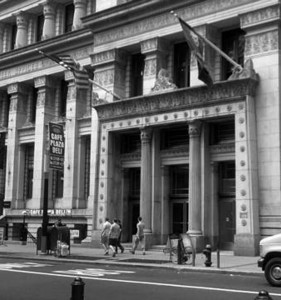 Every morning, I come to work at OU headquarters, located at 11 Broadway, where I serve as a rabbinic coordinator for OU Kosher, administering the kosher programs of approximately 90 dairy companies, comprising about 200 facilities.
Every morning, I come to work at OU headquarters, located at 11 Broadway, where I serve as a rabbinic coordinator for OU Kosher, administering the kosher programs of approximately 90 dairy companies, comprising about 200 facilities.
Even though OU headquarters has been located at 11 Broadway for 15 years, the “kosher history” of 11 Broadway began three quarters of a century ago, with my family. Here is the story:
When the OU announced many years ago that it was moving its headquarters from its Seventh Avenue location to 11 Broadway, I told my father about it as part of a casual conversation. I assumed that my father would thereupon ask me at which cross-streets 11 Broadway was located and other basic information. To my surprise, my father knew exactly where 11 Broadway was, for he had been there many times before. My father proceeded to explain that he recalls how, in his childhood, he would visit his grandfather, Abraham Brill (my namesake), at his law office of Brill Bergenfeld & Brill, located for many years at 11 Broadway. For this personal or sentimental reason, I have always felt a certain comfort and a sense of identification with our 11 Broadway location, as this is where my great grandfather worked, along with my great uncle, Herbert Baer Brill. (My great grandmother, Jeanette Goodman Brill, had also been part of the family’s law firm, but she left the firm when she was appointed by Mayor James J. Walker to the Brooklyn Magistrate’s Court – a first for a woman in those days. Her portrait hangs in Brooklyn Law School as a testament to her alma mater’s pride in her accomplishments.)
Although Abraham Brill was known for his specialization in commercial business law, and he retained many prominent clients, such as National Silver Company and William Morris Theatrical Agency, he also served as long-term counsel to New Deal Kosher Butchers Association. In fact, when I received semicha (rabbinic ordination), my great uncle Herbert gave me a gold tie clip that was given to my great grandfather in 1947 by New Deal Kosher Butchers Association in appreciation of his many years of legal service. (That tie clip was quite likely given to my great grandfather here at 11 Broadway.) Herbert told me a bit about his father’s involvement with the kosher butchers, but I did not ask for details at the time, and the matter remained a mystery to me until I began to research it recently.
(Herbert, who was very dear to us, was an extremely chummy, heimish personality. He once commented to me that that, “I am a Brill and my sister, your grandmother, was a Goodman.” Herbert elaborated how his father was a jolly, extroverted person, while my grandmother, Helen (Brill) Gordimer, was much more sedate and toned down. Having later learned of the geographical origins of my ancestors (and based on gross generalizations!), I understood it quite well, as Abraham Brill, who was born in Botosani/Botoshan, Romania, manifested the outgoing, extroverted personality associated with Romanian Jews. On the other hand, Jeanette (Goodman) Brill’s ancestry was from Grodno and Lomza, which were culturally part of Lithuanian Jewry – a Jewry known for its reserved and less outwardly expressive qualities. My grandmother’s Litvishe Jewish cultural characteristics were thus a perfect match for my grandfather, Dr. Harry Gordimer, whose father came from Minsk and whose ancestors came from Telz/Telshe/Telsiai, from whence all Gordimers hail. (My grandparents’ personal relationship was incredible, forgetting about the Jewish cultural similarities.))
My great grandfather was vocal in his opposition to the impending 1937 Kosher Butchers Strike, and he passionately defended the interests of kosher meat businesses and kosher consumers when a 1943 price differential regulation would have resulted in the closure of 800 kosher butcher shops in the greater New York area and would have jeopardized the availability of kosher meat to consumers. “The problem is not simply one of retail butchers. It takes in the consumer, the men in war plants, the women and children who have been brought up to a realization of the religious rites of their faith”, declared my great grandfather in a public address at a special mass meeting of 1500 members of the American Federation of Retail Kosher Butchers held on March 28, 1943.
Although I am proud of my great grandfather’s role in assisting the kosher industry and the kosher consumer, my greatest appreciation to him and my great grandmother is due to their strong identification with Judaism and the steadfast desire of their progeny to perpetuate Judaism at all costs. Despite the overwhelming tide of assimilation that took its toll on millions of American Jews, especially in the early 20th century – and my ancestors were no exception – certain very tough decisions made by my grandparents, reflective of the firm Jewish identification of my great grandparents, most profoundly impacted my family and continue to have impact to this day in terms of our Jewish commitment and identification.
Although my great grandfather was primarily known for his general law practice, his commitment to the kosher industry and the benefits of his work to the kosher consumer will always resonate most strongly with me.
This is the “kosher history” of 11 Broadway, from whose offices critical legal activity on behalf of the kosher industry was carried out for so many years by Abraham Brill. This is why 11 Broadway will always be meaningful to me.
I thank my family members and relatives for sharing me with me much of the historical information in this essay.
The words of this author reflect his/her own opinions and do not necessarily represent the official position of the Orthodox Union.

